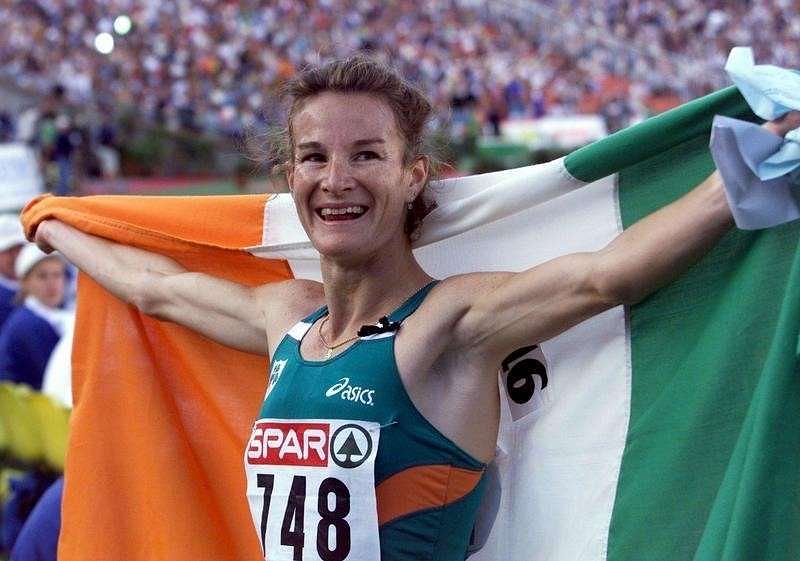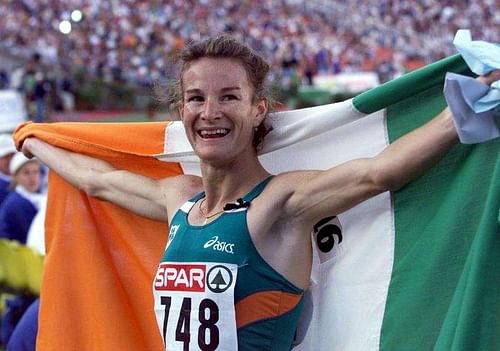
Former World Champion Sonia O'Sullivan does not expect medals despite China doping probe

With world athletics mired in allegations of widespread doping, former world champion Sonia O'Sullivan is not expecting the medals she believes were cheated from her two decades ago to be in her hands any time soon. The Irish distance runner has long been bothered by suspicions about the 1993 world championships, where she was favourite to win the 1,500 metres and 3,000m but was upset by a team of unheralded Chinese runners.
The Chinese women, dubbed 'Ma's army' due to their strict training regime under coach Ma Junren, stunned the world by capturing three distance titles in Stuttgart and then went about dismantling a series of world records.
Nearly 23 years on, the International Association of Athletics Federations (IAAF) is investigating the results achieved by Ma's runners following the publication of a letter in February which alleged they were doped.
But with the embattled world governing swamped by claims of state-sponsored doping in Russia and rocked by corruption in its own ranks, O'Sullivan is unsurprised she has heard nothing further about the probe.
"They have so much other stuff going on at the moment," the 46-year-old told Reuters in an interview in Melbourne.
"I said to my friend the other day: ‘Have they created a department for the re-distribution of medals and records?'
"They have to (investigate it). It’s not going to go away. Whether they do it now or whether they do it in 10 years time, it’s not going away."
Letters signed by Ma's runners
The 21-year-old letter was signed by 10 of Ma's runners, including Wang Junxia, who won 5,000 gold at the 1996 Atlanta Olympics and silver in the 10,000. The reporter who released the letter claimed he elected not to publish it for two decades due to concerns about its sensitivity.
The IAAF has asked the China Athletic Association (CAA) to establish the letter's authenticity and said this week that it had held briefings with the Chinese during the race walking team championships in Rome in early May.
The CAA requested a fax of questions when asked by Reuters to comment on the probe but has not responded. O'Sullivan was runner-up behind China's Liu Dong in the 1,500 at the Stuttgart worlds and fourth in the 3,000 behind winner Qu Yunxia and another three of Ma's runners.
Months later, Qu set a 1,500 world record at the China National Games that was only broken by Ethiopia's Genzebe Dibaba in Monaco last July.
Statute of limitations
Even if the letter's authenticity can be proven, the IAAF said, it falls outside the World Anti-Doping Agency's statute of limitations and a definitive admission of guilt would be required from one of Ma's runners.
Until then, their times, including Wang's surviving world records in the 3,000 and 10,000 from the 1993 China National Games, should be asterisked in the official records, O'Sullivan believes.
"The times they ran later in the year (1993), I have no doubt that they were not clean," she said.
"But there’s lots of them in the statistics books ... Once you start digging, where do you stop? Do you get rid of all the times and start again? You can't really do that because there are a lot of athletes who are clean."
O'Sullivan came fourth in the 3,000 at the 1992 Barcelona Games, a result made all the more frustrating when the silver medallist, Ukrainian Tatyana Dorovskikh, failed a doping test the following year.
She shrugged off the disappointment to win the 5,000 world title in 1995 and five years later became Ireland's first woman to win an Olympic track medal with silver in the same event at the Sydney Olympics in 2000.
Ma and six of his runners had been withdrawn from China's Olympic team a week before the Sydney Games after the athletes failed blood tests.
The coach, infamous for his tantrums and harsh treatment of his runners, had always credited their success to a combination of determination, hard training at altitude and unusual elixirs like turtle's blood soup.
Since the 1990s, extra weapons, including blood passports and the whereabouts rule, have been added to the anti-doping fight but the same air of suspicion and resentment hangs thickly over tracks around the world.
An independent WADA commission found "corruption was embedded" at the IAAF under former president Lamine Diack, who ran the body from 1999 to 2015 and is now under investigation by French prosecutors.
The crimes of individual athletes pale in comparison to the wrongdoing at institutions which have failed to protect the athletes, O'Sullivan said.
"Nobody really stood up and said anything because they were all in it for themselves as well," she said.
"It's the most blatant kind of cheating. Allowing other people to cheat and covering up for them.”